InklusivComm Personas
Using these inclusive speaking personas can help you better understand the needs and expectations of your audience members who have disabilities. Thanks to the detailed…Read more about InklusivComm Personas
The world we live in has never been more connected, and yet, an increasingly high number of us have never felt more dismissed and isolated. When speakers explicitly fail to include people with disabilities in their message, they implicitly tell these same people that they don’t matter. And so they disengage, feeling bored and excluded. And once they’re gone, they’re gone, maybe never to be seen again. Surely, there’s something we can do about that, and this book will show you!
Every year, communication professionals inadvertently shut the door in the face of hundreds of thousands of people with disabilities and elderly folks, adding to the stigma of exclusion, and leaving millions of dollars of potential revenue on the table in the process.
This disconnect leaves people behind, broadens the digital divide, causes irreparable damage to individuals and brands, directly impacts the bottom lines of organizations, and contributes to the degradation of our social fabric. This is a huge societal problem, and this book means to help fix that.
Through this book, author Denis Boudreau, a 22+ year web accessibility and digital equality veteran, shares his perspectives on systemic exclusion as being one of the greatest communication threats to face businesses today, and how brands can be more successful, simply by doing the right thing by their audience and empowering them to truly connect.
As speaking professionals and professional communicators, we pride ourselves on our ability to speak with the masses to the masses and change the lives of many with our thoughts and ideas. But just how inclusive are you really, when it comes to touching the hearts and minds of over 40% of your audience that has disabilities, are ageing, or are somehow marginalized by technology?
As speaking professionals, we all sit somewhere on the spectrum of inclusion. Where do YOU think you fit? Take the free Inclusive Speaking test today!
As I explain in the book, each time we step in front of an audience, we leave money on the table and we leave people behind, if we’re not acutely aware of the needs of audience members with disabilities. Find out just how much you might be losing annually as a speaking professional… if you dare!
The book also covers a seven-step process to building a strategic inclusive speaking plan that it will help you turn your own presentations, keynotes, and workshops into ones that intentionally account for various expectations and needs for audience members who are at risk of exclusion based on disability or other circumstances.
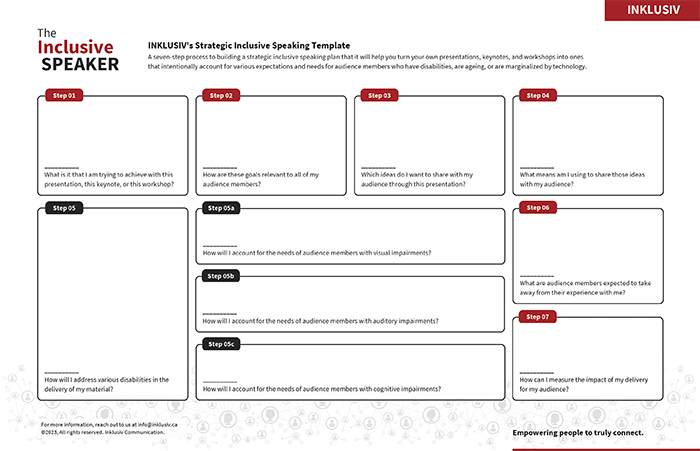
Throughout the book, the following folks are walking us through this journey down the path of the “inclusive speaker”. Through the chapters, you’ll get a chance to meet each one and learn more about their perspectives and their challenges.
As a complement to the book, follow these links to find out more about some of their frustrations and some of the things that make them happy when attending live, in-person, or virtual presentations.

“Some of the worst things speakers, trainers, and other communication experts can do to ruin my experience as an attendee include speakers who phrase everything with “you must” and “you need to” bring out a sense of urgency which causes my anxiety to trigger thinking that I’m already way behind. When speakers put you on the spot and ask you a question, but your answer is laughed about or ridiculed. This is often a validator not to go to the conference again and gives me an overall bad feeling.”

“Some of the worst things speakers, trainers, and other communication experts can do to ruin my experience as an attendee include speakers who shut people down and take away their curiosity by making them feel like their question was silly, or those who make up an answer when they don’t have one. Acknowledge your own limits as needed. Promise to get back to them after having had a chance to do research, rather than answer with confidence with something that may be false and may cause harm.”

“Some of the worst things speakers, trainers, and other communication experts can do to ruin my experience as an attendee include speakers who are dismissive, show stigma or unconscious negative biases towards mental health, and ruin my experience with their poor and inappropriate ableist language. Another example would be speakers who rely on musterbation techniques to create a false sense of urgency and undue pressure in their presentations for dramatic effects. Constantly hearing them say things like ‘you must do this…,’ and ‘you have to do that…,’ can trigger my OCD and anxiety, as I then feel forced into something that I don’t necessarily want to do.”

“Some of the worst things speakers, trainers, and other communication experts can do to ruin my experience as an attendee include slides and screen shares that are challenging for me to read or follow along. More so in-person when the wall is further away, and the lighting is not optimal for me. Low colour contrast, small font size, and overcrowded content have been the biggest hindrances. My vision often causes me to be a slower reader, so even if I can see the slide, I miss the speaker’s elaboration due my slower reading.”

“Some of the worst things speakers, trainers, and other communication experts can do to ruin my experience as an attendee include poorly planned hybrid sessions, especially if there is a delay when online attendees are speaking. Trying to address people in the room and online at the same time when answering questions can be difficult as I don’t know where to focus. Having no long breaks for me to move around will cause my energy levels to deplete quickly as I become fidgety and irritable.”

“Some of the worst things speakers, trainers, and other communication experts can do to ruin my experience as an attendee include speakers who fail to provide a summary of their presentation prior to the session or don’t stick to the one they provided. Without a reliable summary, it’s harder for me to prepare my notes, and it will impact what I manage to remember. I never really know what part of the presentation I’ll retain due to my struggles with notetaking. All I can do is hope that I remember the important details.”

“Some of the worst things speakers, trainers, and other communication experts can do to ruin my experience as an attendee include reading from slides. Densely packed text on slides with someone reading from them just turns me off, and I struggle to concentrate. I have a terrible short-term memory, so I need things that are going to help me remember what is being said. I love slides that either have a quotable key phrase, an associated image, or simple graphic that underlines the point being made by the speaker. If it’s just a repeated narrative I may as well just get a copy of the script and read it at my leisure.”

“Some of the worst things include when speakers are not speaking clearly, are speaking under their voice, or don’t enunciate properly. I like to have captions turned on for pretty much everything, so this is particularly problematic when presentations are not supported with live transcripts or similar services. Lack of structure in the presentation can also be triggering in its own way. Not clearly communicating the ideas, having text-heavy PowerPoint presentation decks… Too much text on a slide draws my attention away from the speaker. It can be a lot to ask, balancing a text-heavy slide with synchronized captions appearing on top of it on a screen.”

“Some of the worst things presenters can do to affect my experience attending their session includes presuming that I can see their slide deck, visuals, or demonstrations, or using words such as “here”, “this”, or “that”. Other things include, but are not limited to, playing a video as a part of their presentation that is not described (with music only), not be prepared for a participant who is blind, conducting activities that I can’t participate in without prior preparation, and speaking with an accent that is difficult to understand or comprehend.”
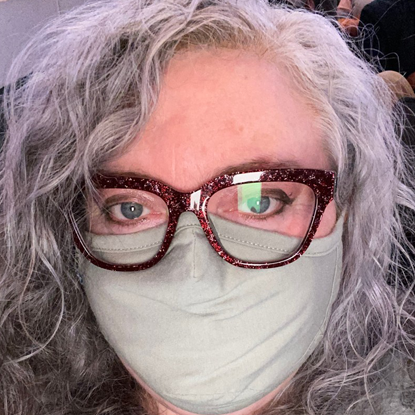
“Some of the worst things speakers, trainers, and other communication experts can do to ruin my experience as an attendee include high-speed graphics, animations, and flashing elements used as part of event designs that can make me nauseous or feel like I’m terribly off balance. In digital events, not being able to turn off moving video, gifs, or animated jpgs is enough to make me have to walk away or turn off the monitor. Scrolling transcripts aren’t my friend either, and I’m not great with scrolling teleprompters at the podium either.”
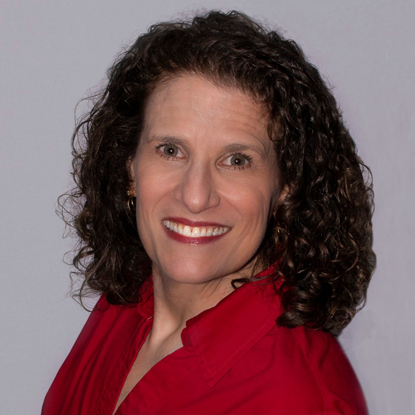
“Some of the worst things speakers, trainers, and other communication experts can do to ruin my experience as an attendee include speakers who walk past me while talking. Or if they don’t walk past me, they walk back and forth, sideways, or turn their heads sideways to look to the side audience. Then, I miss more of what they say. Speakers who mumble or talk fast lose me. I’ll do what I can to leave the room quietly and politely. This is why I rarely attend conferences and services. My time is better spent elsewhere.”

“Some of the worst things speakers, trainers, and other communication experts can do to ruin my experience as an attendee include speakers who say something like “as you can see on my slide.” I recognize this is not an easy habit to break, but it’s also not an easy problem to solve. I give a lot of talks that include code examples on the slides, and although I try to mention that there is a code example on the screen, it’s rarely possible to recite it verbatim, so there is still an element of content that is not conveyed to anyone else who cannot see it.”

“Some of the worst things speakers, trainers, and other communication experts can do to ruin my experience as an attendee include making assumptions during events. The first assumption is that I can speak at a moment’s notice. I can always communicate in one form or another, but I am semi-speaking and an unexpected demand to speak can be very tricky. The second assumption is that I can move. I have very limited mobility and need a harness to sit upright. For that reason, a 10-minute ‘break’ often means sitting alone for 10 minutes as that’s not enough time to unstrap, transfer, and move anywhere. The third assumption is about focus. I work best with 30-40 mins of flowy attention. Content that doesn’t flow very well is intensely difficult for me to follow.”

“Some of the worst things speakers, trainers, and other communication experts can do to ruin my experience as an attendee include consistent references to things being “over here” and “as you can see” during a slide presentation. It’s tough to get through, and I’m sure there’s some body language that the speaker would notice if they were looking at us on occasion. Other irritants are referring to things by color alone as this not only affects me, but also a significant number of likely colorblind folks in attendance. The combination of these is the worst. For example, “As you can see on this side, the items in green are going well.” This is also true for virtual events, except the speaker may not be aware that some attendees are blind or colorblind.”

“Some of the worst things speakers, trainers, and other communication experts can do to ruin my experience as an attendee include being called on or asked to respond to something without time to prepare very well because of my anxiety. I need time to formulate an answer and feel confident; I’m not going to make myself look dumb first. It doesn’t matter if you’re not judging me because I am absolutely judging myself.”

“Some of the worst things speakers, trainers, and other communication experts can do to ruin my experience as an attendee include asking the audience to participate by rapidly reading a load of dense text, and submit written responses under time pressure. I’m dyslexic, and walls of text are difficult for me. Firstly, the anxiety of reading something which is often a picture of text during a fixed period of time is significant for people with print disabilities, and to compound that by asking to compose text under time pressure is a sure-fire way to exclude people like me.”
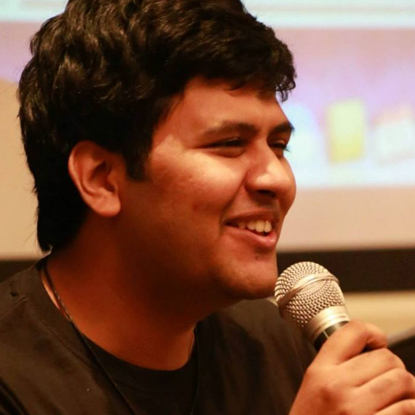
“Some of the worst things speakers, trainers, and other communication experts can do to ruin my experience as an attendee include coming up with fancy titles for their talk, but then the content ends up being something else or very generic. It is very disappointing, as I expect added content or alternate perspectives. Also, a lot of times speakers/trainers talk to the sighted community, so they tend to use a lot of visual cues, and I am left wondering about what is being explained.”
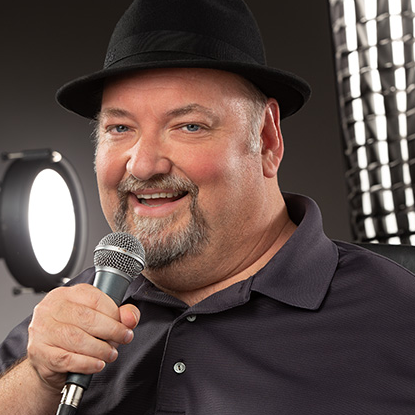
“Some of the worst things speakers, trainers, and other communication experts can do to ruin my experience as an attendee include speakers who ask for volunteers to come on stage and share their experiences. I once raced down the center aisle only to find out there was no way for me to get up onto the stage with my wheelchair. While I still shared my experience, I was simply a voice coming from the darkened front row.”
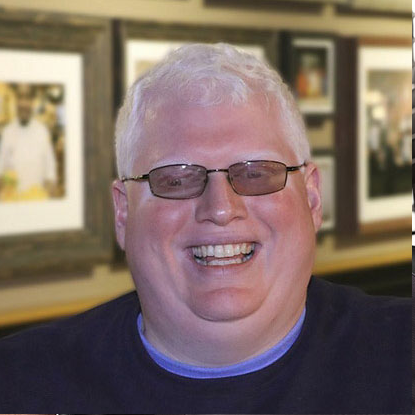
“Some of the worst things speakers, trainers, and other communication experts can do to ruin my experience as an attendee include speakers whose presentations are entirely visual and who pass out handouts with the smallest possible fonts. Most won’t have accessible alternative formats and will give us attitude when pressed about it. It immediately kills their credibility for me, and I immediately stopped listening to what they have to say.”

“Some of the worst things speakers, trainers, and other communication experts can do to ruin my experience as an attendee include not ensuring that microphones, speakers, and audio equipment are clear and functional. Making announcements over a loudspeaker where I need to fight to understand above the din of conversation means I most likely won’t understand the information at all. The positioning of chairs within a room is important to me, so that I can choose a chair that places the majority of the action directly in front of me or to my left side. Chairs that are too tightly placed together or allow my view to be blocked means that I won’t be able to read the lips of the presenters.”

“Some of the worst things speakers, trainers, and other communication experts can do to ruin my experience as an attendee include presenters who depend on their slides to talk or tend not to speak out about the content of the slides and/or will say things like “do it like this,” but do not describe what “this” is. I have often had to ask speakers to describe the content and/or tell me what they were demonstrating and give me the salient points. I even had someone say to me and the rest of the audience, “we don’t have time, so you can just read my slides with your eyes.” That was offensive as she saw me sitting there with my service dog.”

“It really, really irks me when I attend an accessibility talk at a conference and it’s CLEAR the speaker does not give a flying f*ck about folks with ADHD. I had one recently that made my brain melt because of the slide format. Slides should not have too much information on them, or I will read them instead of listening to you. Do not use typography that is hard to figure out, or I will spend most of my time doing that. If you drone on without any animation, my brain will wander.”
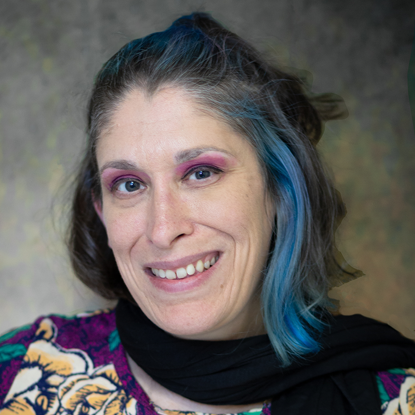
“Some of the worst things speakers, trainers, and other communication experts can do to ruin my experience as an attendee include presenters who build animations and movement into an event that I can’t control or am not alerted about. In my case, fast-paced animations or scrolling content I can’t control makes me nauseous and can trigger vertigo (a feeling of falling and not being able to find my balance).”

“Some of the worst things speakers, trainers, and other communication experts can do to ruin my experience as an attendee include presenters who won’t use a microphone to speak. It makes it incredibly hard for me to hear and/or understand what is said. Similarly, when the presenter doesn’t repeat audience questions when microphones aren’t available for the audience questions, by the time I figured out what the question was, I missed the presenter’s answer!”
“This book is a game-changer. I’ve been speaking professionally for almost 20 years and like to think I have the know-how to engage every member of my audience, yet in reading The Inclusive Speaker I was reminded that effective engagement happens on so many different levels. Many I hadn’t considered. If you’re someone who communicates to audiences in any way, shape or form, this book is a must-read that will not only make your presentation more accessible, it will also make you a better speaker.”
Michelle Cederberg, CSP,
Professional speaker & author of The Success-Energy Equation
“Once in a while a book comes along that leaves you gobsmacked and Boudreau’s “The Inclusive Speaker” is one such book. Just when I thought that my 25 years of platform presentations were truly “inclusive”, I find out that I’ve been leaving a lot of people behind. This book shines a bright spotlight on all of the things that speakers fail to take into consideration when designing and planning their presentations. This is a must read for both aspiring and seasoned speakers who want to resonate with every member of their audience and not leave anyone behind.”
Lorne Kelton,
Critical Thinking & Behavioral Leadership Expert ~ Author ~ CEO ThinkShift Performance Solutions Inc.
“I humbly hang my head and attest to doing better! Thank you, Denis, for helping me see that 40% of my audience have disabilities and, with your wisdom, how easily I can amplify my craft so it’s even more inclusive, engaging and invigorating for all.”
Sarah McVanel, CSP,
Chief Recognition Officer, professional speaker, coach & trainer, Greatness Magnified.
“Imagine reading a book with every third word removed. How much of it would make sense? That’s what it’s like for a deaf or hard of hearing person in your audience. If you want to grip them and the many others who are struggling to catch your beautifully crafted speech you worked so hard on, then RTFM … err … read THIS frickin’ manual!”
Meryl K. Evans,
LinkedIn Top Voice in Disability Advocacy. TEDx, keynote, and professional speaker
“I wish this book existed ten years ago when I started attending conferences. It’s THE starting point for anyone looking to be mindful of folks like me who aren’t neurotypical. This book provides concrete tips and strategies to make your talk and speaker deck more inclusive and engaging. Want to connect with an ADHD audience? Check out this book!”
Myriam Jessier,
SEO consultant and public speaker
“The Inclusive Speaker is essential reading for speakers. You want to reach the widest audience possible and to not exclude anyone already in the room! It covers everything. I love the mix of storytelling, first-hand guidance from audience members and how-to checklists on speech delivery, presentation materials and your environment. It’s my go-to guide whenever I speak.”
Jennifer Chadwick,
Senior accessibility specialist
“‘The Inclusive Speaker” offers incredible insight on how you can connect with your audience. Denis beautifully blends wisdom from working in the field with plenty of research. This is a must read for anyone who wants to grow their business and brand.”
Dave Brown,
Professional morning radio show host & public speaker
“This book couldn’t have been written at a more appropriate and relevant time, as the world is recognizing the importance of Diversity, Equity, & Inclusion (DE&I). In this book, Denis challenges the norm on how we view non-discriminatory and supportive environments, and highlights how far we are, as a society, from being inclusive to people with disabilities and declining abilities. While ‘The Inclusive Speaker’ is geared towards presenters to make their message accessible to all, I feel this book is a must read for everyone from an awareness, learning, and usability perspective.”
Rony Pawar,
Strategic business consultant & bestselling author
“Being inclusive as a speaker isn’t about how small or big your audience is, it’s about showing ALL of your audience that you care. It’s what everyone should be doing per default. This book should be a staple for every professional out there.”
Miriam Nabinger,
Accessibility consultant & UX Designer
“A must-read for speaking professionals, this book is very much needed. I encourage everyone to read it to learn more about the impact you can make, if you only speak in a way that includes people with disabilities.”
Dennie Declercq,
Public speaker, autism & accessibility expert
“Denis’ book contains useful insights and anecdotes that help speakers understand the how and the why of inclusive communication and presentation techniques. As someone that has been speaking about inclusion for many years, there are still things that I learned from reading this book. It is written in a way that you can build your techniques and your collaterals bit by bit, so that you move from instinctive to inclusive in your presentation style and materials.”
Neil Milliken,
Vice President Group Accessibility and Digital Inclusion, Atos
“Denis’ book changed the way I think about my business, but more importantly, it changed the way I think about people.”
Les Kletke,
Best-Selling Author, Principal & Co-Founder at Write.Publish.Market., Ghostwriter, Book Coach
“Audience engagement happens on so many levels, and this book reveals just how many of them are being overlooked or ignored. The Inclusive Speaker shares how a small (or sometimes large) tweak to your words, your slides, and to how you interact with your audience will make the difference between engaging absolutely everyone, or simply a select few (and leaving the rest behind). With this book, you may never again miss an opportunity to present to 100% of your audience. Written with the highest levels of respect to all of humanity, this is a must-read book!”
Suzannah Baum,
Best-Selling Author – “From Nervous to Nailed It”, Presentation Skills & Leadership Communication Expert
“Denis is an authority on diversity and inclusion. Not only does he have a wealth of knowledge on the subject and is one of the most honest people I know, he lives the pages of this book in his daily life. Even though I thought I knew a lot about the subject, Denis has elevated me to a whole new level. This book is essential reading for every speaker, entrepreneur and organization.”
Nathalie Plamondon-Thomas,
2021 Canadian Presenter of the Year – 12x International No.1 Bestselling Author
“This book is a must read for every speaker and facilitator! It is packed with value, including checklists with opportunities to make a difference. I really appreciated the stories and ‘in their own words’ segments to ensure that no one is left out. I can’t wait to get the print copy and use my highlighter.”
Patricia Regier,
Regier Education Inc. Speaker and author of The Online Shift, 101 Pro Tips for Online Facilitators, Workplace Trainers & Virtual Speakers
“A MUST READ! One of the most important books of our time for any speaker or presenter. This book will give you a cutting edge to truly connect with your audience – in ways you did not know before.”
Azadeh Yaraghi,
Branding Specialist, Creative Director, Bestselling Author | and Professional Speaker
“Denis’ breakdown of the significance of accessibility for businesses is an absolute game-changer! With real facts and data to back up his statements, this book is a must-read for any leader who is serious about promoting disability inclusion in their organization.”
Cam Beaudoin,
Keynote Speaker and Digital Accessibility Specialist
“I always knew of Denis’ passion for inclusivity and his talent as a speaker, but little did I know how wonderfully well he could explain all of these principles in such a fun and, yes, inclusive way! This is a must read for any speaker who wants to understand how to include their entire audience. And I would be so bold as to say it’s also important for corporations who want to understand how to communicate with customers, employees, and all stakeholders.”
Danielle Silverman,
Business consultant and professional speaker
“Diversity, Equity, and Inclusion (DEI) efforts all too often forget about disabled folks. Denis’ book firmly brings back disability to the equation. He leverages his experience as an accessibility expert to share solid insights and actionable steps you can take to make your presentations more inclusive. He also centers the experience of disabled people by sharing their testimonials to illustrate issues and how you can prevent them. This is a unique and most important book to read for anyone who is serious about public speaking.”
Nicolas Steenhout,
Accessibility speaker, trainer, and consultant
“I can’t think of anyone better than Denis Boudreau to bring the Inclusive Speaker to our attention. Denis reminds us that we all show up differently, as each of us wish to be included in the journey. The Inclusive Speaker is a game-changer for those who want to create a more inclusive world through effective communication. Denis’ passion and expertise are palpable, and I feel inspired to put these practical tips and strategies into practice!”
Rob Rudy,
Leadership development expert and keynote speaker
“Good communication is the bedrock of almost everything people do together, and we owe it to each other to be better communicators. The Inclusive Speaker is a book I wish all my teachers, professors, supervisors, and other communicators have read, and I’m so excited to see this much awesome advice packed into one place!”
Desiree White,
User experience designer & accessibility aficionado
“I’ve always admired Denis’s ability to connect with an audience. His undeniable quality as a public speaker is no accident. In this book, Denis shares with us the secret to his success: leave no one behind, a contemporary vision on public speaking.”
Rocio Alvarado,
Senior Digital Accessibility Specialist
“Learning that up to 40% of the room I speak to might struggle with hearing or reading my message has transformed me as a speaker. This book is also for all educators. If you speak in front of an audience, this book is for you.”
Hélène Tremblay,
Professional speaker, author & photographer
“As someone that works with hands in event planning, associations that host events, and accessibility this is the overlap of all of my professional worlds. As a disabled accessibility and inclusion advocate, this is the guide and explanation of how our work impacts people, the humans we bring together. The educational content alone is powerful. The guide for how to implement inclusive speaking by design and strategy should be part of every speaker’s toolkit. Inclusion as part of strategy for communications and presentations can change the world for the better.”
Sam Evans, CAE, ICE-CCP, MBA,
Accessibility Advocate & Certification Manager at International Association of Accessibility Professionals
“If you speak or present in your job, or are part of an organization that wants to be inclusive in their communications, this book is a MUST have. Denis’ content is a revelation and I refer back to it frequently. Most presentations have serious flaws when it comes to inclusivity – be it related to colour, font, presentation style etc. Most of us are unaware of this because we haven’t been trained in this area. Now is our chance to improve!”
Jason Reid,
Disability Speaker. Author – “Thriving in the Age of Chronic Illness and Invisible Disability.”
“This book is a must-read for anyone who wants to make their communication more inclusive and impactful. Whether you’re a seasoned speaker or just starting, this book will equip you with the tools and knowledge to connect with your *entire* audience. Highly recommend!”
Christina LeVasseur,
Independent SEO Consultant at MediaSesh
“Denis delivers a poignant and thoughtful approach to understanding both the value and importance of considering the modalities and capabilities of your audience. It’s a clear guide explaining why inclusive speaking is important, how it benefits your audience, and how it ultimately benefits you as a professional. Denis’ passion for, and expertise in, accessibility shines through.”
Aaron Pearlman,
Senior UX Designer at IMDb.com | Amazon
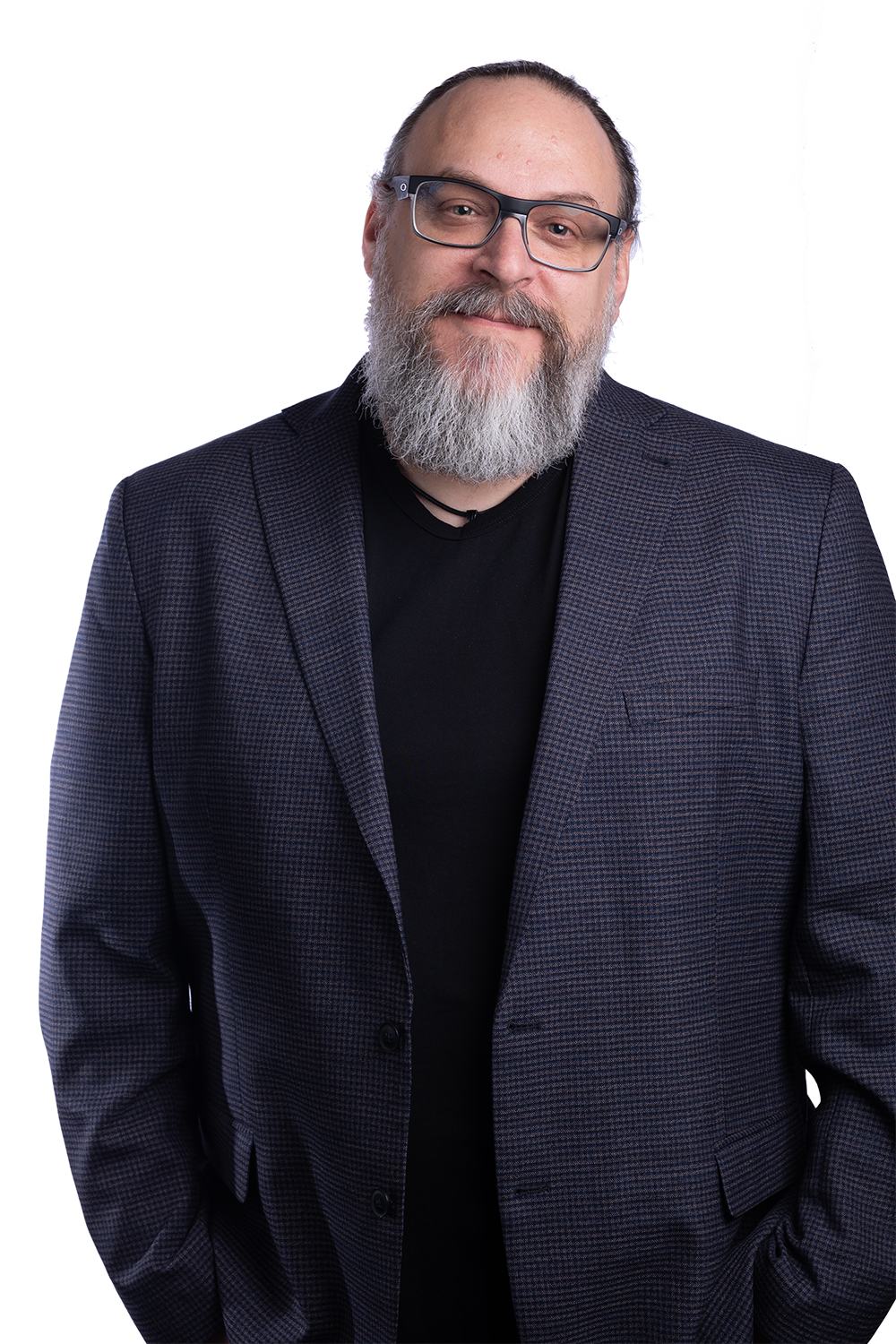
Hello there! I’m a consultant, trainer, coach, and speaker specialized in helping organizations create truly inclusive digital experiences for everyone, including people marginalized by the use of technology due to disabilities, ageing, or other circumstances. My mission is to empower people to truly connect with organizations, their brands, and the messages they convey.
I work with leaders who want to develop inclusive communication skills online or from the stage, for themselves or for their teams. I help organizations communicate more inclusively with their audiences, by removing the barriers that can get in the way of up to 40% of the population who struggles with our use of technology – including those who have disabilities or are simply getting older.
This book is about me sharing some of my most impactful inclusive communication secrets with you. You can learn more about them (and me) by tagging along on social media, particularly on LinkedIn, Twitter, Instagram, and Youtube.
Using these inclusive speaking personas can help you better understand the needs and expectations of your audience members who have disabilities. Thanks to the detailed…Read more about InklusivComm Personas
Many users abandon inaccessible sites without ever filing a complaint. Silence is often misread as success. People adapt, leave, or disengage quietly. Organizations that rely on complaints as a signal dramatically underestimate the real impact of digital barriers on customers and users.